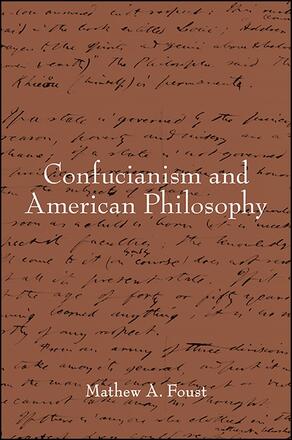
Confucianism and American Philosophy
Alternative formats available from:
A comparative analysis of Confucianism and the American Transcendentalist and Pragmatist traditions.
Description
In this highly original work, Mathew A. Foust breaks new ground in comparative studies through his exploration of the connections between Confucianism and the American Transcendentalist and Pragmatist movements. In his examination of a broad range of philosophers, including Confucius, Mencius, Xunzi, Ralph Waldo Emerson, Henry David Thoreau, Charles Peirce, William James, and Josiah Royce, Foust traces direct lines of influence from early translations of Confucian texts and brings to light conceptual affinities that have been previously overlooked. Combining resources from both traditions, Confucianism and American Philosophy offers fresh insights into contemporary problems and exemplifies the potential of cross-cultural dialogue in an increasingly pluralistic world.
Mathew A. Foust is Associate Professor of Philosophy at Central Connecticut State University. He is the author of Loyalty to Loyalty: Josiah Royce and the Genuine Moral Life and the coeditor (with Sor-hoon Tan) of Feminist Encounters with Confucius.
Reviews
"…Foust's book succeeds masterfully in its stated task: proposing five new points of convergence between Confucianism and American philosophy. The book not only increases our understanding of each tradition relative to the other; it also significantly broadens the discussion to include less-often-included representatives of American philosophy. " — American Journal of Theology & Philosophy
"…an engaging comparative analysis concerning ancient Chinese versus American Transcendentalist and Pragmatist traditions…" — Religious Studies Review
"Confucianism and American Philosophy is a marvelous example of what Robert Cummings Neville has dubbed 'Boston Confucianism,' which refers to an irenic membership comprising everyone outside of the East Asian cultural milieu who treats Confucianism as a valuable philosophical resource. This book should be of interest to multiple audiences: philosophers and religionists interested in comparative philosophy, classical American philosophy, the Confucian tradition, and the productive interplay between the two traditions. I highly recommend it. " — Stephen Dawson, Reading Religion
"…a valuable resource for those working in either Confucianism or pragmatism, as it is the first text in this area to adopt such a wide-ranging and systematic problem-based approach to the two traditions. The work feels well-suited to the historical moment and the state of [the] field: it serves as a bridging text, establishing the foundations for wider debate as the field of comparative philosophical studies evolves. " — Notre Dame Philosophical Reviews
"Authoritative and insightful, this book fills two lacunae in East-West comparative studies. First, it rounds out several general thematic connections by taking a broad view, rather than focusing narrowly on just one figure from each tradition. And, in so doing, it sheds much needed light on Confucian comparisons that have been previously understated or completely unnoticed. " — Christopher C. Kirby, editor of Dewey and the Ancients: Essays on Hellenic and Hellenistic Themes in the Philosophy of John Dewey